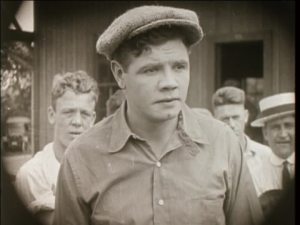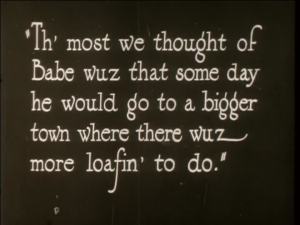Babe Ruth stars in this highly fictionalized and idealized biopic of his early life. Not a word of it is true but it is not without its corny charm.
This is my contribution to the Athletes in Film Blogathon. Be sure to read the other posts!
Home run?
When Headin’ Home was released in 1920, Babe Ruth was already a superstar of the baseball world. His contract had been infamously sold to the New York Yankees by the Boston Red Sox that same year and it soon became apparent that the sale had not been a smart strategic move for Boston. (The Red Sox did not win a single World Series title between 1918 and 2004, a long dry spell attributed to the Curse of the Bambino.)

I’m going to level with you: I would rather watch paint dry than attend a baseball game or even watch one on television. The only sport I find more distasteful is soccer and that is only because I was forced into the kiddie league at the age of four. Clearly, this was not the best activity for a child who would rather be watching Mighty Mouse or Star Trek and I spent the entire season trying to be as far away from the ball as possible. In any case, I have no interest in comparing real sports statistics or delving too deeply in the facts of Babe Ruth’s life. What does interest me is the examination of early celebrity culture and the general entertainment world of the 1920s, baseball included. Because of this, my review will focus on how Headin’ Home works as a mainstream film of 1920 and how it measures up to other movies of the period.

The story is pure hokum. An old-timer watching Ruth play for the Yankees decides to recount Ruth’s early life and career. This plot device fails spectacularly because he then describes events that he could not possibly have witnessed. It’s really an excuse to flood the screen with “clever” title cards in Old Country Geezer™ dialect.
Ruth lives with his mother (Margaret Seddon) and kid sister, Pigtails (Frances Victory) in a teeny-tiny hamlet. A quiet lad who spends most of his time carving his own baseball bat, Ruth admires Mildred Tobin (Ruth Taylor) from afar but she only has eyes for the city slicker louse who is also the star pitcher of the local baseball team. Said louse also manages to keep Ruth from playing ball because he has a shady gambling scheme.

So, will this movie involve:
The louse being a no-good gambler in the bargain?
A last-minute player substitution that puts Ruth on the field?
A manufactured bat that shatters—get this boy his hand-carved slugger!
An averted elopement during which the deluded country gal finds out her city lover is a cad and bounder?
A noble rescue by the jilted bumpkin?
A country boy who makes good but never forgets his roots and his dear old mom?
All of the above, yes, yes, yes. In fact, this movie could serve as a case study for Movie Cliches 101 as it pretty much manages to get every sports movie/origin story trope. I was absolutely shocked that the slow clap scene was not included but I suppose it would be impractical in a silent film.

…
On second thought, don’t bother.
Ironically enough, a film that revolves around baseball comes to a screeching halt whenever baseball is played onscreen. I think it’s the awkward blend of actors and generic stock footage.
As I stated before, I do not take this film to be a factual account of Ruth’s life. Even a baseball anti-fan knows that this bucolic vision is so much hooey. Ruth’s childhood was considerably less sunny, with six of seven siblings dying in infancy, wild behavior while still a small boy and a stint in a Catholic reformatory. However, because its phoniness is so obvious and Ruth’s real life history is so easy to find, there is no real risk of this film tainting the historical record. I am ready to give it a pass.

In fact, the coarseness of the plot has a certain charm all its own. The story is so stupid, so naïve, so clichéd that it kind of works.
The supporting cast is okay—neither remarkably good or bad—but now we come to a major problem: Babe Ruth was a fine baseball player but he was no actor. He lumbers through his scenes as though he has cement in his shoes and his face never registers any emotion except mild embarrassment at being there. Since this is a complete melodrama with unrequited love and a redemption plot, you can see how Ruth’s limitations would pose a challenge. The supporting cast is obliged to keep things (and Babe) moving along.

Ruth would be far more comfortable and natural when he performed his cameo in Speedy (1928). Of course, he had had eight years to grow accustomed to his celebrity status and to feel at ease when being filmed. Plus, Speedy did not require him to do much besides express comic horror at star Harold Lloyd’s horrendous driving, as opposed to being the Tol’able David of the baseball diamond or whatever the heck Headin’ Home was trying for.

Headin’ Home was a comparatively low budget production with no stars to speak of besides Ruth. The film’s producers paid their central performer only part of his $50,000 salary and used a rubber check to cover the rest. With the film only a moderate success with tepid reviews, there was no more money to pay Ruth and he later sued to recover the balance of his money but was unsuccessful. (You can read more about the background of the film in the Reel Baseball essay collection.)
One of the clearest indicators of Headin’ Home’s low budget origins is its use of title cards. You see, intertitles were cheap to make and could be used to pad out the runtime of a film. The cards in this film are the work of journalist Bugs Baer, who is prominently featured in the opening credits. Baer is said to have coined Ruth’s nickname, the Sultan of Swat, as well as various other pithy sayings.
As a title writer, Baer proves to be…off. Behold his handiwork:
There are too many cards in the film and they all seem to be reaching for weak laughs. A properly written title card has snap and with and, above all, it gets its point across in a pithy, punchy manner. Instead, Baer’s title cards just sort of take up time and seem to shout, “Look at me! Look at me!” They’re just plain annoying. Just when the audience gets a bit invested in the story, another title card shows up to explain the obvious with a tired quip. It’s no wonder that Baer did not write for the movies again until the coming of sound.
The film also has some elements that are… uncomfortable. We also get the requisite ethnic jokes (Italians eating tons of garlic, tee hee!) and angry townspeople attempt to lynch Ruth. With overreactions like that, I think we can agree that it is a good thing that baseball is no longer the national pastime of the U.S.A.

Headin’ Home is corn right off the cob but the unabashed hokum has a charm of its own. As an actor, Ruth is a pretty good baseball player but the rest of the cast is able to support him and somewhat disguise his deficiencies as a performer. I enjoyed this movie a lot more than I probably should have. It has its flaws but the first half is a surprisingly solid piece of entertainment. It loses its way in the grand finale but is pretty watchable on the whole.
Movies Silently’s Score: ★★
Where can I see it?
Headin’ Home is available on DVD as part of Kino Lorber’s Reel Baseball collection. (Buy carefully as there are soooo many products called Reel Baseball. Get a new pun, people!)






My brother has always been an avid baseball fanatic and has a huge collection of baseball cards stemming from his childhood when that awful gum was in the pack. He might get a kick out of this film.
I can definitely see a baseball fan enjoying the old-timey vibe of this film.
Gosh! And here I thought the manufactured bat that shatters was original to The Natural … I wonder how much else I know that ain’t true.
Well, in all fairness, it may not be original to this film either. There doesn’t seem to be very much new about it and it may very well have lifted the scene from another sports film.
This is in the “So bad it’s hilarious” category for me. Pure unintentional comedy gold.
Yeah, it’s quite the little cheeseball.
I guess Babe thought a movie would be quicker than a Vaudeville tour in the off-season. I guess he thought wrong.
If one may be so bold as to inquire, just what is the national pastime if it isn’t baseball? (I’m always a little behind times.)
I believe the most-watched sport in the USA is American-style football but if you want the national pastime, I would say it’s probably complaining about picayune matters on the internet 😉 We are a nation of skilled kvetchers. (Myself included, I ranted and raved about a minor computer glitch quite recently.)
Kvetching! The first sport I have ever displayed a knack for.
I think there’s a good card to be had in that “Babe made that crook apologize in six languages and Esperanto”, although it needs work to be brought out.
Yes, it’s better than the rest. I mainly included it because I love me some Esperanto references!
First of all, I love that you used the word “hokum”. A person knows they’re in for a treat when that word makes an appearance in a film review.
I also like the list of clichés you’ve catalogued for this film. Some sports movies practically write themselves, no?
This sounds like a must-see film, excessive title cards and all. You’ve given us readers fair warning, and I can’t wait to track it down.
Thank you! Yes, this film is pure cheese but once you know that, it’s quite a bit of fun.